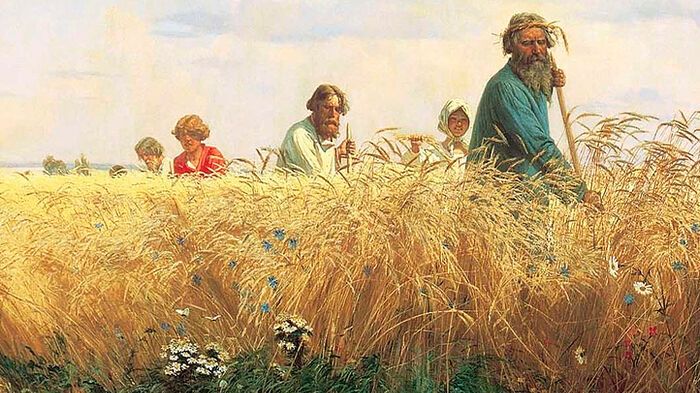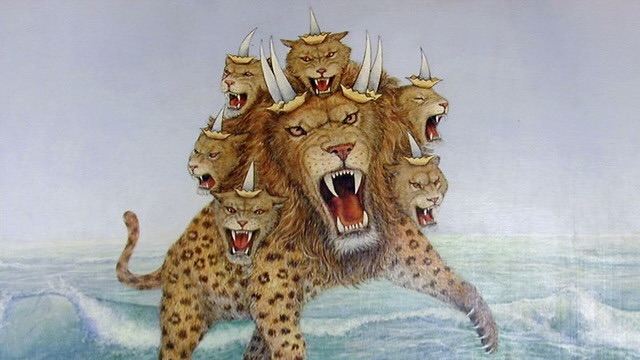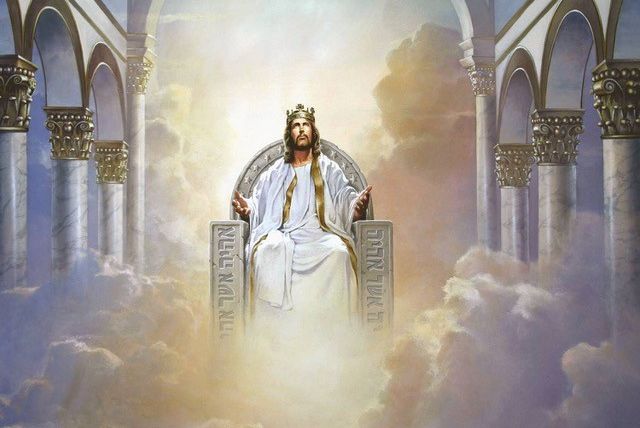Book of Revelation – a series presented by pastor Michael Walker
Lesson #18 – Revelation, chapters 14-15
Chapter 14
The sequence of the Three Angels’ Message that enfolds God’s Last Warning Message to this world is as follows: The First, being the call of “the everlasting gospel” within the context that the time of Judgement has now come, is motivated by God’s love for the human race; it invites us into a right relationship with Himself. That is followed by the Second which alerts us to what has gone wrong in Christendom, while the Third warns us about what is soon to come and the serious consequences that will follow those who refuse to take heed to God’s call of mercy. Our attention is then directed to two separate harvests – the Grain Harvest and the Vintage Harvest. Everyone is given the choice as to which one they will experience. One will end in glory while the other ends in destruction.
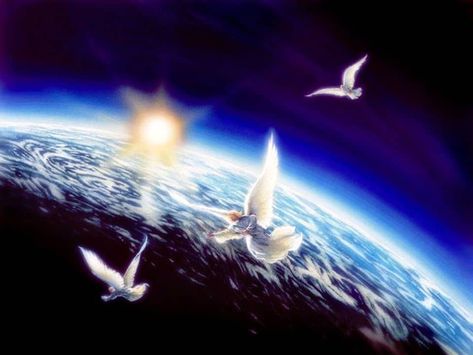
Summary of God’s Last Warning Message to the World
vs. 6-12
The three individual proclamations of the Three Angels’ Message are three parts of God’s last-day message to the world.
1st Angel: The call of “the everlasting gospel” to the world, includes the warning that “Judgment has come”, yet it is an invitation to have a meaningful relationship with God and to worship Him as the Creator.
2nd Angel: Alerts us to the fact that Babylon – apostate Christendom – has fallen from the truth and from loyalty and commitment to God.
3rd Angel: Warns about the serious consequences of those who choose to worship the Beast, its image or receive its mark.
This three-fold message is not a threat but a warning given in love. This is a cosmic battle between Christ and Satan: between the Kingdom of God and the kingdom of Satan: between the true God and Ruler of the Universe and the counterfeit god who wants to rule the earth.
It must be remembered that “the everlasting gospel” undergirds the entire three-fold message of Revelation 14.
The Outcome of Satan’s Warfare Against Christ

vs 9-11
It will be complete destruction by fire: 2 Thessalonians 1:9; Revelation 20:7-15. One of Satan’s counterfeit teachings has been the immortality of the soul. This false doctrine leads to the inevitable conclusion of eternal hell-fire that will never be extinguished, with its pitchforks, demons, purgatory and limbo. Eternal fire is not fire that will never be extinguished but it is fire that will result in eternal destruction.
The Bible uses the word “eternal” or “forever” to refer to ‘life as long as it lasts’ in any given situation. To illustrate, let us take a few examples:
– “Forever”: Jonah was in the great fish for 3 days and nights: Jonah 1:17; but is referred to as “forever”: Jonah 2:5,6.
– Hannah lent her son Samuel to serve the Lord “forever”: 1 Samuel 1:22; that meant “as long as he lives” 1 Samuel 1:28.
– David was chosen by God to be king “forever”: 1 Chronicles 28:4; but he actually reigned for 40 years 1 Chronicles 29:26-28.
– Eternal fire”: Sodom and Gomorrah are an example of what will happen to the wicked: Matthew 25:41; 2 Peter 2:6; Jude 7. These cities were consumed. They are not still burning today! The outcome is eternal.
– God will destroy Satan with the rest of the wicked by fire: Malachi 4:1-3.
v. 10
The “wine of God’s wrath” will be poured out undiluted into the “cup” of God’s indignation (i.e. wrath or anger). The context is clear, that those who choose to drink the wine of the wrath of Babylon’s fornication (v.8), will ultimately drink the wine of God’s wrath!
vs 9, 10
The Bible symbolizes God’s judgements upon the wicked as ‘pouring out God’s wrath’ or ‘drinking from the cup of God’s wrath’: Psalms 75:8; Jeremiah 25:15-17; Habakkuk 2:16. “Unmixed”, “without mixture” – i.e. undiluted. Mild drink would have been diluted with water; but the longer they drank, the more they craved for something stronger until they drank at the other extreme of mixing it with spices and drugs to make it more intoxicating: c.f. Proverbs 23:30; Isaiah 5:11. In Isaiah 51:17, God refers to them drinking “the dregs” – in the final judgement, the wicked will be required to empty the cup of God’s wrath by drinking the entire contents of divine retribution. This will not just be destruction by fire but experience the 7 Last Plagues that will be poured out beforehand: Revelation 15:1. When God’s protection is withdrawn from the earth, there will be “a time of trouble such as never was” (Daniel 12:1; Revelation 7:1-3). Then the wicked will feel the full fury of being abandoned to the consequences of their wickedness!

The Everlasting Gospel
vs 6, 7
It should not be overlooked that “the everlasting gospel” undergirds the entire proclamation of the Three Angels’ Messages to this fallen world; and it is encapsulated in our Saviour’s Own words: John 3:16. Although the “wages of sin is death” (Romans 6:23), Jesus paid that price with His Own lifeblood, so that we need not perish but have everlasting life (1 Peter 1:18-21).
By becoming our Substitute, it meant that Jesus had to drink of that cup of God’s wrath down to the very dregs: Matthew 26:36-43. The death that the wicked will eventually face suffer (i.e. “the second death” Revelation 20:6) will be eternal separation from God. That is what Jesus tasted, that He experienced when He hung on Calvary’s Cross (Hebrews 2:9). That was expressed in His forsaken cry: Matthew 27:46. Indeed, Jesus drank from that bitter cup for everyone, so that those who choose to accept His final invitation proclaimed by the first of those three angels could stand on the side of Christ and escape the wrath to come. This is why Jesus was “given up” so that we can be put right with God: Romans 4:25.
In this text, the Greek word is paradidwmi (paradidõmí) – “handed over”, “given up”, “delivered up”. This same word is used when Jesus was betrayed and handed over to be crucified: Matthew 17:22; John 6:64,71; John 19:16. The essence of this word is made clear by the apostle Paul in the Book of Romans. The apostle begins to explain what “God’s wrath” actually is. The word “wrath” in Romans 1:18 is orgh (orgæ), meaning “anger”, “wrath”. It should be noted that when we speak about God’s anger, we are not referring to uncontrolled anger but about abandonment. Hence, in Romans 1:24, 26, 28 he gives several examples of persistent, sinful behaviour, by stating that God “gives them up” – in each case, the Greek word is paradidwmi (paradidõmí). In other words, by His wrath God releases the unrepentant to the consequences of their own sinful desires. Jesus drank from that cup for all of us, so that we may have eternal life – He was given up and forsaken on our behalf: Romans 4:25. Those who reject His call of mercy – i.e. His gracious offer of redemption, will experience divine wrath when they are given up at the end of time (Revelation 20:11-15).
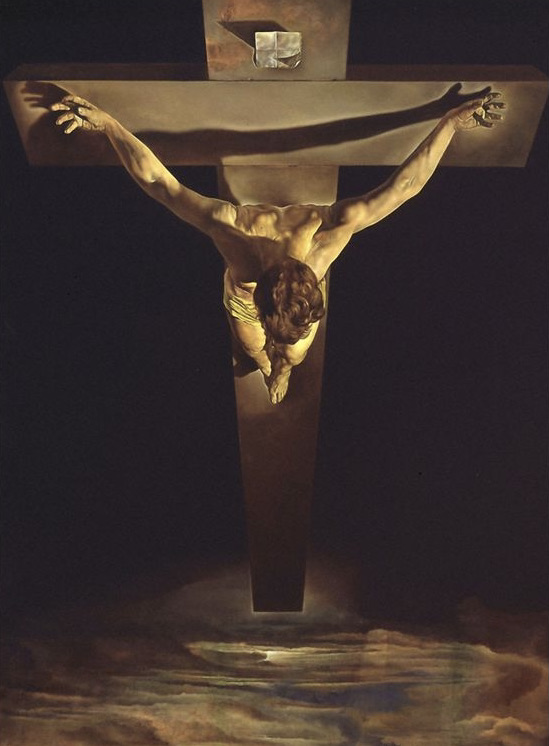
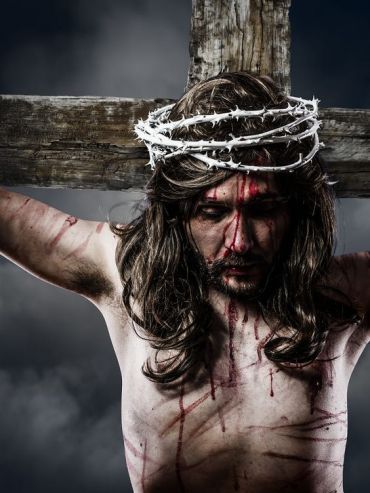
A Word of Assurance for the Faithful
vs 12, 13
In the final conflict outlined in Revelation 13:11-17, of which the message of the Three Angels of Revelation 14:6-12 is given, Jesus identifies those who respond to His final call of mercy and offers them a wonderful, reassuring promise. This period of conflict will be in the Time of Trouble that commences before the Close of Human Probation. It undoubtedly has a reference in connection with Revelation 13:15 about those who are put to death for being loyal to Christ. The blessing is reiterated in Revelation 20:6; they are sleeping safely and securely in Christ until He returns in glory: Colossians 3:1-4.
The Two Harvests
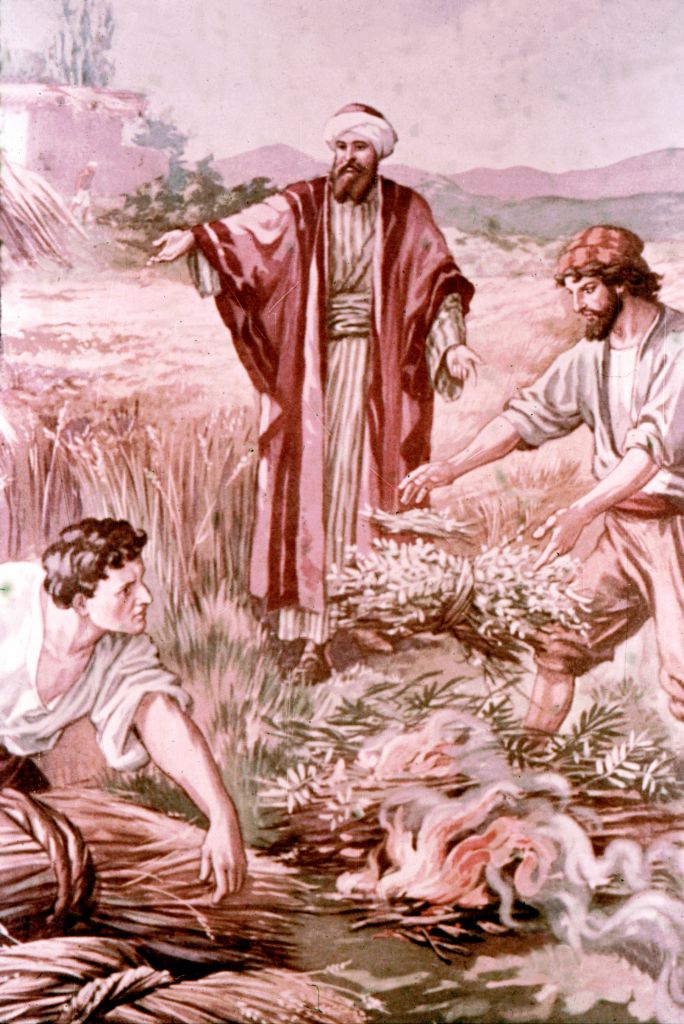
Jesus spoke about the harvest in parables (Matthew 13). In His explanation, Jesus said that the harvest is the end of the world (Matthew 13:39); the wheat and tares – i.e. the saved and the lost respectively (v.38) – will be separated at that time: the saved will enter the Kingdom (v.43) and the lost will be burned up with fire (vs 40-42).
Revelation 14 identifies two harvests. Both Jesus and the prophet Daniel mentions two resurrections (John 5:28,29; Daniel 12:1,2); and the prophet John was shown that there will be 1,000 years between those two events (Revelation 20:5-9). Those two events are two destinies: the first is eternal life while the second is eternal destruction (2 Thessalonians 1:7-9).
The First Harvest is the Grain Harvest
vs 14-16
Christ now appears seated on a white cloud, wearing a golden crown and holding a sharp sickle. The sickle is symbolic that the time to reap the ‘wheat harvest’ has come. When Jesus returns in the clouds of heaven (c.f. Revelation 1:7; Luke.21:27; Act.1:9-11), He will separate the wheat from the tares – i.e. the saved from the lost.
v. 15
“The harvest of the earth is ripe” – indicates the time when everyone has made their choice as to where their loyalties are; and so this is the reason why Christ returns to claim His Own. Those who respond to God’s grace will be in the First Harvest. The faithful adherents of Christ who are alive when He returns will be blessed along with those who died in the Lord as they will have part in the First Resurrection: 1 Thessalonians 4:13-17.
The Second Harvest is the Vintage Harvest
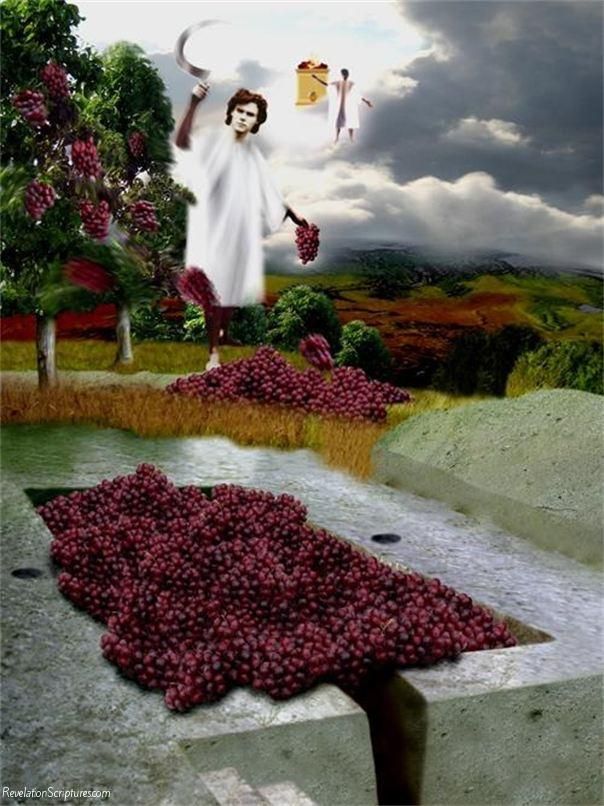
vs 17-20
Although the wicked will be separated by the act of translating the saints to Heaven, they will perish before His glorious presence: c.f. Revelation 6:14-16; Revelation 1:7; Matthew 24:30,31; 2 Thessalonians 2:1,8. They will be raised to life at the end of the 1,000 years to face the Final Judgement.
The ancient agricultural year in Palestine had two main harvests – the grain harvest and the vintage harvest. These two events are used in Scripture to portray the outcome of the great controversy between Christ and Satan. The final destruction of the wicked is prefigured by the vintage harvest: Joel 3:11-17.
v. 19
“The great winepress of the wrath of God” is figurative of the wicked meeting their punishment. Part of that experience will be to suffer the plagues being poured out before Christ’s Second Coming.
“Up to the horse bridles” is a figure of speech drawn from ancient literature expressing the utter annihilation of the wicked being trampled to death while the horses are wading through the deeply flowing river of their victim’s blood.
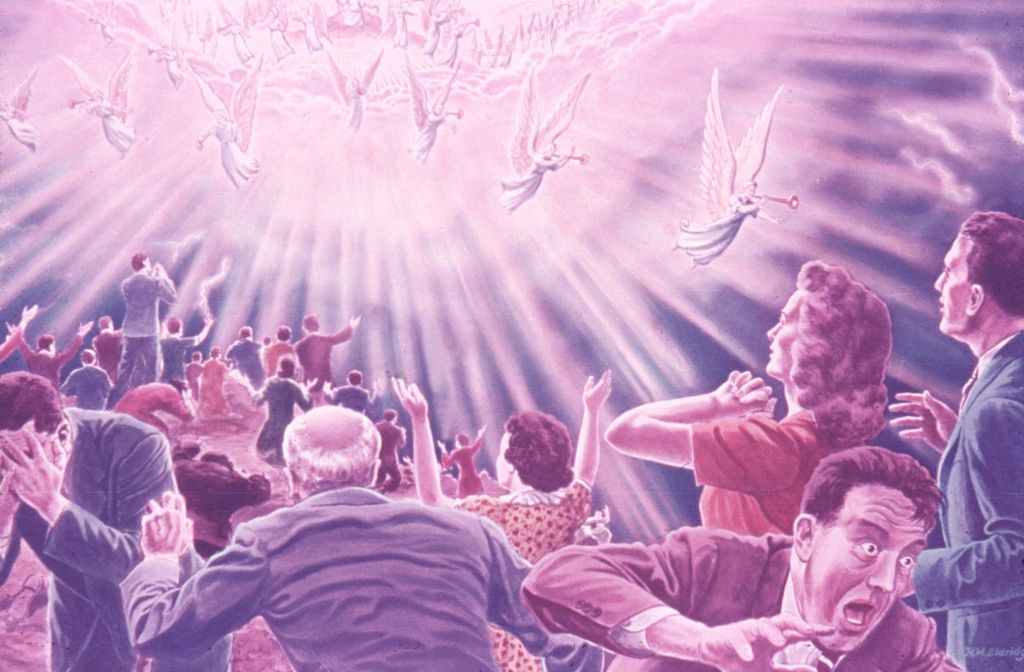
Chapter 15
The Song of Moses and The Lamb on the Sea of Glass
The vision at the beginning of Revelation 14 comes to encourage those who belong to Christ when they pass through the Time of Trouble. They are the ones who are sealed, the 144,000, standing before the throne with the Lamb: Revelation 14:1-5. Following the vision of the final conflict outlined in Revelation 13, Christ offers encouragement and reassurance to His faithful saints who keep the commandments of God and have the faith of Jesus – He is really saying, ‘Hold on there – don’t give up – I am with you always – I am coming soon!’
v. 1
When the door of God’s mercy finally closes, the 7 Last plagues will be poured out upon the wicked.
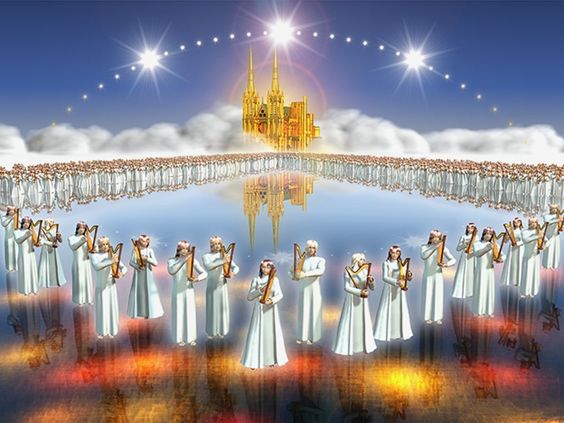
vs 2-4
The first section of Revelation 15 undoubtedly follows on in the sequence of events outlined in the previous two chapters because the scene once more reveals the redeemed, the 144,000, standing on the sea of glass, singing the song of victory: The Song of Moses and The Lamb. This scene is like a parenthesis surrounding the Time of Trouble that is yet to come. It is like the assurance of God hovering over His beloved saints who face trial and persecution. They will share in Christ’s victory! The Song of Moses was a song of victory! Israel had just passed through a ‘time of trouble’ by the Egyptians who tried to destroy them. They met an impasse from where they saw no way of escape but the Lord opened the Red Sea before them and destroyed their enemies (Exodus 15:1-18). Once the saints are delivered from their enemies who will seek to destroy them (Revelation 13:15), their song of deliverance will be an even greater song of victory for this will be the Song of Moses and the Lamb!
The full video presentation is available below:


